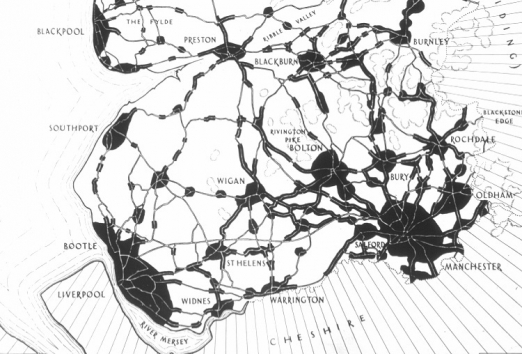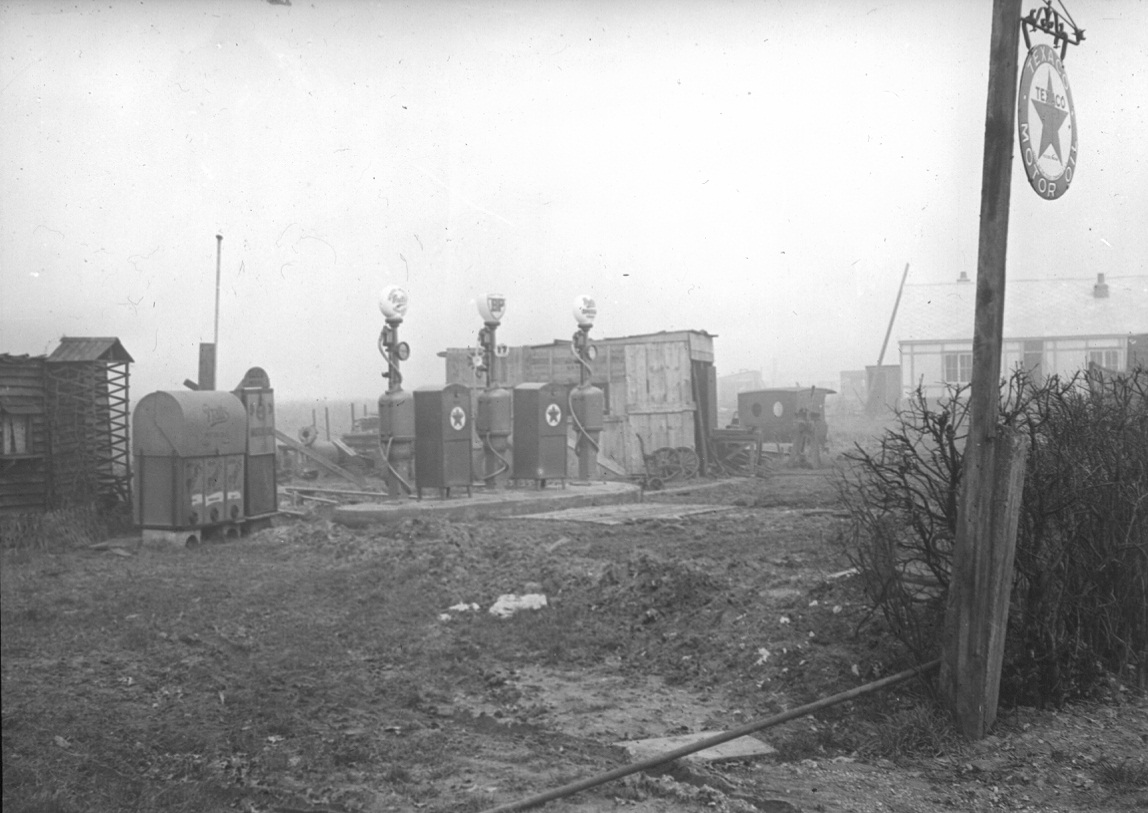Neville Chamberlain was a lifelong member and supporter of CPRE as both Minister of Health (with responsibility for housing) and Prime Minister, even making the remarkable speech which launched the organisation to the public in 1926.
Horrors, atrocities and monstrosities
 A CPRE Lancashire map showing 1920s 'ribbon development' - Chamberlain's main concern for the countryside
© CPRE
A CPRE Lancashire map showing 1920s 'ribbon development' - Chamberlain's main concern for the countryside
© CPRE
In 1928, Chamberlain appointed CPRE as official architectural advisors on rural housing design; ten years later, he made CPRE consultants in the process of planning new aerodromes and munitions factories, so that the hurried preparations for the Second World War would not destroy the very countryside we would be fighting for.
He was the guest speaker at CPRE’s inaugural meeting on 7 December 1926, and his speech was referenced by Hilary Benn MP in his 2014 CPRE Annual Lecture. Prompted by this, we are pleased to publish Mr Chamberlain’s speech in full, as a fascinating and evocative snapshot of the condition of England at the time of CPRE’s formation, nearly 90 years ago.
"I suppose that I have been invited to be present here this afternoon because I am responsible for the Department which has in its charge the control or the direction of local authorities, and in particular the initiation of housing and town planning schemes, I cannot disguise from myself that, unconsciously, and indeed, unwillingly, my Department has been responsible for some of those horrors, atrocities and monstrosities to which the chairman has referred, and as I watched the state of indignation into which the chairman was working up this audience as a preparation for their acceptance of his resolution, I could not help wishing that that great bridge-builder, my colleague the Minister of Transport, was here, that I might offer him up as an acceptable sacrifice before I myself embarked upon my address.
I most heartily give my support and approval to the objects of this new Council. I am sometimes accused of being so much of a town mouse that I have neither understanding of nor sympathy for the interests of the country. I can assure you that nothing is further from the truth. The very fact that I do my work in the town and I take my recreation in the country is perhaps a reason why I should be, as I am, deeply concerned at the persistent and rapid defacement of the countryside, which is proceeding to-day at a pace far in excess of anything we have ever known before in our history. I think there are two aspects of the problem before this Council. One is the spoiling of the undefiled countryside by what is called ribbon development along our new or widened roads. The other is the destruction of the character of our rural villages and towns by the erection of new buildings which are out of harmony with them, either on account of their design, their materials or their siting.

Ribbon development was bringing inappropriate development to rural villages, such as this petol station in Surrey
As for the first – the ribbon development – besides being undignified, if not positively offensive, it is also uneconomical, wasteful and inconvenient. It is uneconomical because it turns on to the roads a new volume of traffic which ought to be quite unnecessary. It is wasteful because it means the laying of long lines of pipes and wires and services which could serve a very much larger number of houses if the houses were properly arranged. And it is inconvenient because it forces the inhabitants to walk quite unnecessary distances in order to reach the nearest station or shopping centres, or even to visit one another. Therefore both the community at large and the local authorities have really every interest in stopping development of that character, quite apart from its aesthetic abomination. As to the other aspect, the examples which have been given us by the chairman could be multiplied indefinitely. Everybody, I suppose, is familiar with some instances of desecration of that character.
I welcome the advent of this Council because it offers the prospect of the formation of a body of an authoritative character whose raison d’etre is that they should devote themselves to the demonstration of the evils that are going on and to the concentration upon the means of preventing or curing them. But it is much easier to diagnose these things than it is to cure or prevent them. I was looking at the objects which it is suggested should be placed before the Council. These are three. They are to concentrate attention upon the evils which we desire to prevent. They are to give information on how those things are to be protected which we desire to protect. And, finally, to educate public opinion.
I like those objects, and I like them all the more because there are only three of them, and that they do not include that fourth object which so frequently figures in the problems of well-meaning societies – namely, to harry and worry the Ministers of the Government, and in particular the Minister of Health. I think there is too strong a tendency nowadays to fly to the Government to find a remedy for every evil, the best remedy for which often lies in the hands of the people themselves. It is very easy, of course, to suggest that one should prevent the erection of these offensive buildings by giving to local authorities powers to control the elevation and the sites. But at once that raises the old question of quis custodiet ipsos custodes. Who is going to take care that the local authorities themselves do not suffer from the same errors of taste or of artistic sense which have influenced the people who proposed these horrors?
When we say, why does not the local authority stop the ribbon development and insist that houses shall be properly grouped on a site which is suitable for them? We must recognise that when restrictions of that kind are put upon land you at once raise the question of compensation. As these difficulties frequently occur in the areas remote from towns, rural districts where the rateable value is small, it is not to be wondered at that they hesitate before they incur liabilities which might completely drown them. I myself feel that what we want at the moment is not so much fresh legislation – although I can imagine some legislation which might help – the really important thing is to be found in that third object of the Council for the Preservation of Rural England – to educate public opinion. Public opinion can be brought to understand the real importance of preserving for the public the character of the countryside. Then you will find that legislation will be quite unnecessary. Up to the present the difficulty is that when the public is confronted with the fact that if it wants a thing it has got to pay for it, it at once begins to consider how much it does want, and it has to be educated to see that it is really worth paying for.
There are two other ways in which this Council can help. It can draw attention in specific cases to threats against specific buildings or beauty spots of one kind or another. It can assist in raising funds from voluntary sources for the purchase of those buildings or those spots of land. And though the raising of money is always a thankless task, yet incidentally any work which this may initiate or support of that kind has its bearing on the question of educating the public. The publicity that must be given, the notice that is taken in the Press, the number of fresh people who, because they have subscribed, take an interest in the subject, all those things have their effect and help in the general education of the public.

CPRE's first logo, designed by the etcher Frederick Landseer Griggs, was part of the campaign to influence public opinion which Chamberlain recognised as of vital importance
The other direction in which this Council might give assistance is by offering to local authorities that technical advice and assistance of which so many local authorities, and especially the smaller bodies, really stand in need. I think there are many authorities who feel that the responsibility of deciding whether a given elevation was sufficiently in harmony with its surroundings would be more than they would care to take upon their own shoulders, even if they could support themselves by quoting the opinion of their permanent officers. After all, many of these permanent officers have not had the sort of training which is required really to give an opinion worth having upon such subjects. You need the assistance of those who have qualified as specialists in the subject. If local authorities could appeal to some sort of advisory body, composed of experts of acknowledged standing in their profession, to assist them in deciding upon these very difficult problems of taste, it would give them a confidence which they do not feel to-day, and it would encourage them to ask for greater powers than they have hitherto thought it advisable, perhaps, to apply for.
There is in a private Bill, promoted by the Corporation of Bath, a clause known to the initiated as “the Bath Clause,” which provides a tribunal of a kind to which questions on the elevation of buildings in the City of Bath are referred, and whose decision is final on that point. That is a recent experiment, for the Bill was only passed in 1925. But we at the Ministry of Health have prepared a model clause which is based on the principle of the Bath Clause, and we shall from time to time show this model clause to other local authorities who may be promoting town-planning schemes or private Bills of their own; and I think it very possible that the experiment will be extended and tried in other places besides Bath. I feel that our task of encouraging the local authorities would be very much easier if through such a body as this we could inform them that they could command the services of people who are really qualified to give them proper assistance and advice.
Some of you may perhaps feel that such suggestions as I have made do not carry us very fast, or even very far. But although there is some virtue in patience, I think we must remember that we have got to walk before we run, and that an attempt to go too fast in front of public opinion would probably give a set-back to the movement, which would be very unfortunate. We must begin with a certain caution. I consider that the formation of body such as this is a real step forward from the practical point of view, and that it will enable the pace to be very much quickened in the future if it is as successful as I hope, and that it will bring nearer the time when we can begin to think about legislation which will enable greater restrictions to be placed upon individual liberty than perhaps public opinion would tolerate today."
The Rt Hon Neville Chamberlain MP
Minister of Health (with responsibility for housing)
Find out more: Take a look at CPRE's incredible history on our timeline of achievements
More featured articles
-
We're making some changes2019-08-01Calling all graduates...2019-06-24Women countryside campaigners: the 1920s2019-01-31The landscapes they left behind2018-11-09A deposit return system for England2018-03-28Emma Bridgewater on CPRE's big ideas2017-07-24My England: the photographer’s vision2017-04-19Leicestershire: A Heritage at Risk2017-01-05And that’s a wrap!2016-12-23What next for rural England?2016-12-16Finding inspiration in the Green Belt2016-12-16Protecting our literary landscapes2016-12-07Celebrating 90 years of CPRE2016-12-07Web survey book winners announced2016-10-28Why we should buy locally produced food2016-09-27



